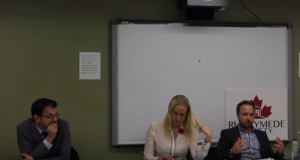On Monday, March 21, 2016, the Runnymede Society will host a debate at the University of Toronto Faculty of Law.
The title of the debate is: The Legitimacy of the Welfare State: Governments in Pursuit of the Public Good. Bruce Pardy, Professor of Law at Queen’s University Faculty of Law, will debate Jason MacLean, Assistant Professor of Law at Bora Laskin Faculty of Law, Lakehead University, on the issue of whether state regulation is a legitimate means of pursuing the public good. Professor Pardy will argue against state regulation and in favour of markets, while Professor MacLean will argue in favour of state regulation.
The debate is being held at Emmanuel College- EM 302 between 12:30 – 2:00 p.m. on March 21. If you are able to attend, please contact Joanna Baron at jbaron@theccf.ca.
A link to the debate announcement on the University of Toronto’s website can be found here.
 Advocates for the Rule of Law
Advocates for the Rule of Law




Take the side that opposes regulation.
In Cooper v. Hobart (November 2001), the Supreme Court of Canada essentially ruled that regulators cannot be held liable for incompetence, laziness or malfeasance. It wrote (at paragraph 44), “the statute does not impose a duty of care on the Registrar to investors with mortgage brokers regulated by the Act. The Registrar’s duty is rather to the public as a whole. Indeed, a duty to individual investors would potentially conflict with the Registrar’s overarching duty to the public.”
At paragraph 49 it added, “the overall scheme of the Act mandates that the Registrar’s duty of care is not owed to investors exclusively but to the public as a whole.”
Exactly what actions must the regulators perform in order to fulfil their alleged legal “duty of care” owed “to the public as a whole”? Who among the public other than the actual investors in a specific case would have the slightest interest in what the regulator was doing?
Whether the result is right or wrong, these reasons are irrational, unworkable and irresponsible.
Then at paragraph 54 the Court said, “the spectre of indeterminate liability would loom large if a duty of care was recognized as between the Registrar and investors in this case.” This is true, but it applies to any government agency. The CBC once lost a defamation case (Leenen) that cost it nearly a million dollars. Taxpayers don’t want to cover for that either. The only rational way to avoid losses like this to the public is to privatize everything that is not the police, military or courts.
Some years later, in St. Lawrence Cement v. Barrette (December 2008), the Supreme Court of Canada ruled that businesses can still be held liable for pollution even if they adhere to regulations.
The combined effect of these two judgments is that, since regulators cannot be held liable and since the regulated still can, regulations are worthless and unnecessary.
The abolition of regulation would mean more “judge-made law”, but that comes with the territory.
I don’t read Cooper v. Hobart as immunizing regulators from liability. As paragraph 48 of the judgment makes clear, the Registrar of Mortgage Brokers can still be sued for acting in bad faith. This is a right explicitly permitted by statute (s. 20 of the Mortgage Brokers Act), but even where no relevant statute sets out the liability of a particular regulator, the common law tort of abuse of public office remains available as a cause of action against anyone acting on behalf of the regulator.
Cooper v. Hobart is certainly notable for refusing to entertain a general duty of care towards the public by regulatory bodies, but it didn’t place regulators above the law.